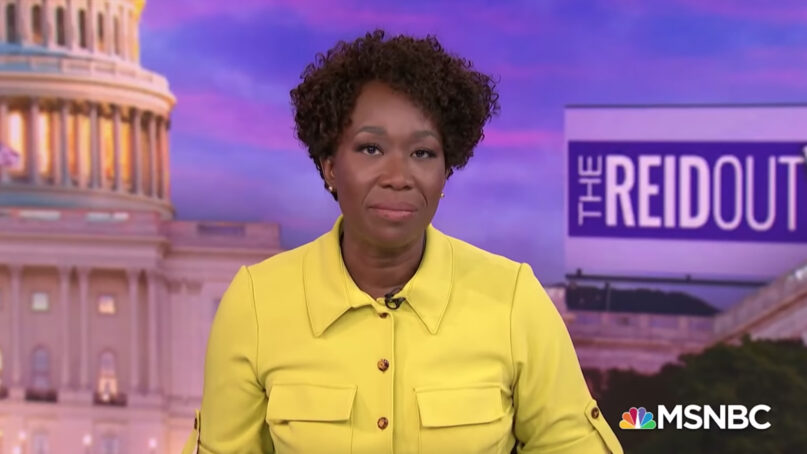(RNS) — On Tuesday (Sept. 1), MSNBC host Joy Reid compared President Donald Trump’s seeming support for those committing violence at protests to “the way Muslims act.” Reid’s comment came during a panel discussion on Trump’s reluctance to condemn violence carried out by his supporters in Kenosha, Wisconsin, and Portland, Oregon.
Reid was attempting to draw a comparison between Trump’s stoking violence against his political opponents and leaders in the Muslim world, who, she said, “talk a lot of violent talk and encourage their supporters to be willing to commit violence, including on their own bodies in order to win against whoever they decide is the enemy.”
Reid’s comments drew criticism from both sides of the aisle. U.S. Rep. Ilhan Omar, a Muslim congresswoman from Minnesota, tweeted: “This kind of casual Islamophobia is hurtful and dangerous. We deserve better, and an apology for the painful moment for so many Muslims around our country.”
In a surprise to some, Trump also condemned Reid’s remarks, though somewhat inaccurately, tweeting, “The very untalented Joy Reid should be fired for this horrible use of the words ‘Muslim Terrorists.’”
RELATED: Nike, don’t make me choose between Liverpool FC and the Uighurs
Whatever your politics, Reid’s comment drew on a stereotype that equates Muslims with violence. The problem with reinforcing these kinds of stereotypes is that they confirm biases not only about Muslims “in the Muslim world” (by which Reid presumably meant Muslim-majority countries from the Middle East to Indonesia) but everywhere people encounter Muslims, including here in the United States, which nearly 4 million Muslims call home.
Yet the Institute for Social Policy and Understanding found in a survey two years ago that American Muslim adults reject violence more than any other group in the U.S. American Muslims are more likely than the general public to reject violence against civilians by the military as well as by an individual or small group.
The Anti-Defamation League reported in 2019, meanwhile, that right-wing extremists have been responsible for more than 70% of the 427 extremist-related killings in the U.S. over the past 10 years, far outnumbering those committed by domestic extremists acting in the name of Islam.
At least some of this right-wing violence was visited on Muslims: In 2016, Pew Research found that assaults against Muslims surpassed the modern peak reached in 2001, the year of the 9/11 terrorist attacks, along with a 19% increase in anti-Muslim hate crimes from 2015 to 2016.
To compare right-wing perpetrators of violence to “the way Muslims act,” then, is just plain wrong in light of the facts.
But what about “the Muslim world”? Several studies have shown that Islam is not a significant contributor to violence even in Muslim-majority countries, if factors like lower gross domestic product per capita are considered. Rather, Muslims around the world have overwhelmingly negative views of the Islamic State group, known as ISIS, and the vast majority hold that suicide bombings and other forms of violence against civilians in the name of Islam are rarely or never justified.
For four years ending in spring 2019, we led a study involving thousands of U.S. students of all faiths known as the Interfaith Diversity Experiences & Attitudes Longitudinal Survey, or IDEALS. Our research teams at The Ohio State University, North Carolina State University and Interfaith Youth Core asked students at the beginning and end of college about their attitudes toward other groups and their commitment to bridging religious divides.
In our new national report, “Bridging Religious Divides Through Higher Education,” we discovered that among all faith groups, graduating Muslim students were the most highly committed to bridging religious divides (88%), which included agreement with statements such as “I am currently taking steps to improve the lives of people around the world” and “I feel a sense of good will toward people of other religious and nonreligious perspectives.”
They eclipsed Jews (82%), Catholics (78%), mainline Protestants (70%), atheists (66%), evangelicals (65%) and others on this front.
Even more, Muslim students were the most likely to turn these values into action. Out of all faith groups, Muslim students were the most likely to affirm that they had developed a deeper skill set in college to interact with people of diverse perspectives (44%), beating out evangelicals (37%), Hindus (35%), Jews (26%), Buddhists (22%) and others.
Reid’s comments only serve to further skew the truth of the American Muslim experience. We know from our work with Muslim students that they aren’t the perpetrators of violence but the victims of it. Muslims reported hearing or reading insensitive comments about their religion on campus at higher rates than their peers. While fewer than 1% of all students regularly encountered insensitive messages about their religious or nonreligious identity, 7% of Muslim students reported such encounters on a frequent basis.
Misguided perspectives about Muslims are not confined to any political perspective. Though Islamophobia has traditionally been linked to political conservatives, Muslim author-scholar Khaled Beydoun observed “a swelling population of leftists who embrace progressive principles yet see Islam as inimical to liberal values and in conflict with American identity.”
Indeed, media outlets of all kinds tend to represent Muslims negatively, and the media is where most Americans learn about Muslims. People like Reid can tell a new story by using empiricism to disrupt and refute misleading information about Muslims and send the message that Muslims may serve as role models for democratic healing.
(Kevin Singer is a doctoral student in higher education and a research associate for IDEALS. He can be contacted on Twitter @kevinsinger0. Matthew J. Mayhew (@MattJMayhewPhD), a professor of educational administration at The Ohio State University, and Alyssa N. Rockenbach, a professor of higher education at North Carolina State, are IDEALS’ co-principal investigators. The views expressed in this commentary do not necessarily reflect those of Religion News Service.)





